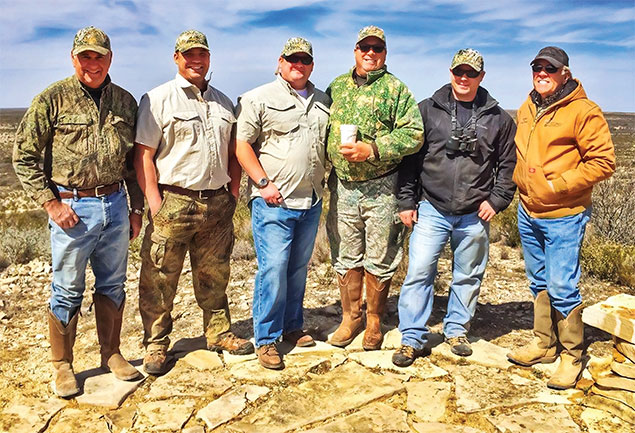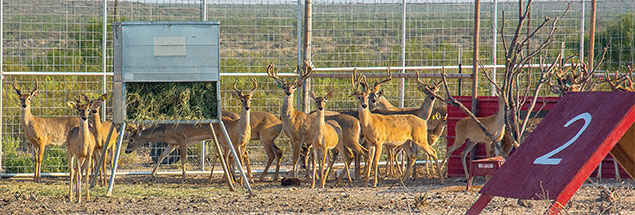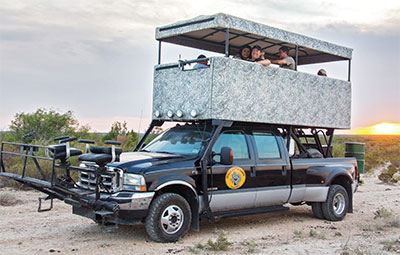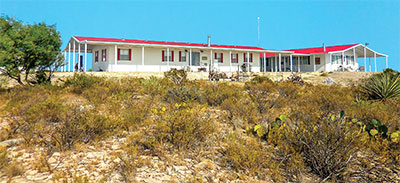
Courtesy of Chandler Walker
Devil's Canyon Ranch partners with the Bush Institute to host hunts with wounded warriors. Pictured on the ranch last fall are, left to right, hunting guide David Scarbrough, wounded warriors Chandler Harris and Jacob Schick, ranch owner John Hall, wounded warrior Matt Phillips and ranch owner Robert Helms.
The evening sun slips away as a black dually pickup bumps along a caliche road at Devil's Canyon Ranch, an hour northwest of Del Rio, Texas. Up ahead of the truck, scaled quail skitter across the dusty road, and a black-tailed jackrabbit hunches by a clump of prickly pear cactus.
"Look at those two big bucks!" exclaims passenger Gary Luker, pointing to a pair of white-tailed deer in the distance, nearly hidden by mesquite and cenizo. At the wheel, John Hall brakes and reaches for his binoculars to confirm the sighting. With eagle eyes of his own, Hall soon spots a white-tailed doe and two fawns, several mule deer and a blackbuck in the thick brush.
"This place is a dream come true for us," says Hall, who works in San Antonio and co-owns the 7,900-acre hunting ranch with Luker of Blanco, Texas, and two other friends — Robert Helms Jr. and Tom Pisula, both of Houston. "We were tired of hunting leases and wanted our own ranch where we could call the shots, run our trophy deer-breeding program and host wounded warriors."
Hall, Helms and Pisula — businessmen who share a passion for hunting — purchased the Southwest Texas property in August 2013 with Capital Farm Credit financing. Luker bought an interest in the property a year later.
"It's been a great pleasure to work with such a devoted group of individuals who epitomize land stewardship," says Randal Prehoda, Capital Farm Credit's senior loan officer in Conroe, Texas. "They're making good use of land that can be challenging. I'm very proud to be a small part of what has become a first-class operation."

Photo by Sheryl Smith-Rodgers
With antlers in velvet, bucks gather around a feeder in the whitetail breeding pen.
For more than a decade, Hall and Helms shared South Texas deer leases. Family, friends and business associates, including Pisula and Luker, hunted as guests. On their last lease near Carrizo Springs, the pair took over an existing scientific deerbreeding program.
"When the oil fields kicked in, the ambience changed," Hall recalls. "There were floodlights at night, and noisy trucks going in and out. The landowner didn't have a well, but he was horizontally drilling and fracking next to the fence line." In 2011, their last year on the lease, neither of them harvested a trophy deer.

Photo by Sheryl Smith-Rodgers
A dually pickup outfitted with a top drive and front bumper seats is ideal for viewing wildlife or sunsets. It accommodates 10.
From Leasing to Owning
No more leases, the two agreed. Instead, they'd buy their own land, with Pisula as a third partner.
"I bet I visited more than 100 ranches," Hall says. "When I found one I liked, then Bob looked at it, too. We found a lot of ranches that we loved, but the oil field was always there. Or a ranch might have a million-dollar home, which we didn't want."
Then they turned their search westward.
"As soon as I saw this place, I knew I'd found our ranch," Hall says. "It was the turnkey operation we wanted because it already had accommodations, a high fence around 3,400 acres, water wells in place, and water stations and protein feeders everywhere. Otherwise, it would have taken us 10 years to get all that up and running.
"And there are no oil fields around here," he adds, smiling.
What's more, the ranch had an extra-large metal barn and holding tanks for diesel, gasoline, protein feed and corn. "We can store 40 tons of protein in the tanks," Hall says. "Those really sold me on this ranch, because then I knew we could run our deer-breeding operation here."
Wide-Open Country
Remote and arid, the ranch stretches for miles, reminiscent of classic Western movies that the men watched as kids.
"This is John Wayne country with lots of elbow room," Pisula says. "I was taken by the ranch because of its panoramic views. I also enjoy the diversity of wildlife and natural beauty."
The land's open skies especially appeal to Luker, who for years traveled to West Texas on business and even has a lease in the area. Looking south from the ranch on a clear day, he can see Mexico's mountains on the distant horizon.

Photo by Sheryl Smith-Rodgers
The lodge will sleep a large hunting party or the ranch owners and their families.
"I've always loved the ruggedness of this place and the vast scenery," he says. "You can sit up at the lodge and watch three storms coming in at the same time. When the guys offered me a piece of this ranch, I jumped on it."
Only native wildlife and exotic game animals, including axis deer, blackbuck and aoudad, inhabit the Devil's Canyon Ranch, named for the steep limestone gorge that borders the property. No livestock have been on the land for the past 12 years, which has allowed the largely brushy habitat to rebound. This year, above-average rainfall has kept springs flowing in the canyons.
Breeding Mule Deer
Soon after buying the ranch, the partners built five high-fenced pens and restarted their deer-breeding operation. They also launched a permitted mule-deer breeder program, one of only a few in Texas.
"Our No. 1 goal is to raise quality bucks and does to release on our ranch," Hall says. "We've invested a lot of money in our whitetail program, and brought in quality genetics from quality breeders."
To start the program, the partners had 15 does artificially inseminated and also bought 12 stocker bucks, which they turned loose on the ranch. Then they added nine more bucks and three does, which over two seasons have produced about 40 fawns.
"My fellow warriors and I were taken aback by the substantial size and awe-inspiring beauty of the property. If you’re ever fortunate enough to visit this majestic place, then you’ll surely leave with a full soul."
– U.S. Marine Cpl. Jacob Schick
Two high-fenced, 50-acre pens house mule deer, a native species indigenous to the Trans-Pecos and Panhandle regions.
"We're in the infant stage of our breeding program," Hall says. "Our goal is to grow big mule deer to turn loose in our lowfence areas."
Four species of quail — scaled (blue), northern bobwhite, Mearns and Gambel's — have been documented at Devil's Canyon Ranch, which also hosts quail hunts. To support the population, the partners have placed feeders across the property.
"When you feed quail and deer, you're also taking care of the other wildlife, such as gray foxes, chipmunks, porcupines and raccoons," Hall says, noting that the ranch also has some bobcats and an occasional mountain lion.
Honoring Military Heroes
Framed photographs hanging in the lodges capture the smiling faces of disabled military veterans who've hunted at Devil's Canyon Ranch. For many of them, the experience of harvesting a game animal was a first.
"Wounded warriors are near and dear to my heart," says Helms, who works closely with the George W. Bush Institute's Military Service Initiative. "At the ranch, we want to show our appreciation for what they've sacrificed for our country."
The ultimate purpose of the three-day retreats is to allow veterans to decompress and share camaraderie in an open-air atmosphere where they feel safe. During the first two seasons, the ranch hosted 14 wounded military personnel.
"We take these guys out, one-on-one, and sit with them in the blinds," Helms says. "When you hear what they've been through and seen, it'll eat you up."
Last fall, retired U.S. Marine Cpl. Jacob Schick of Frisco, Texas, attended a wounded warrior hunt at Devil's Canyon. He had lost his right leg and endured 46 surgeries and 23 blood transfusions after his Humvee hit a mine in Iraq in 2004.
"It was wonderful to get away from the concrete jungle and recharge with fellow warriors in nature. We were treated with a lot of respect, and the accommodations were great," says Schick, who portrayed Wynne, a severely wounded Marine, in the movie "American Sniper."
"The outdoor experience at Devil's Canyon Ranch was something to be remembered for a lifetime," he adds. "My fellow warriors and I were taken aback by the substantial size and awe-inspiring beauty of the property. If you're ever fortunate enough to visit this majestic place, then you'll surely leave with a full soul." – Sheryl Smith-Rodgers
Bush Military Service Initiative Aims to Empower Veterans
The George W. Bush Institute's Military Service Initiative (MSI) honors the service and sacrifice of post-9/11 veterans and military families by improving their well-being and unleashing their potential.
Ultimately, its goal is to encourage communities, nonprofits, businesses, academia, philanthropists and individual citizens to support jobs, wellness, family, education, housing and women's veteran issues.
Funded by the George W. Bush Foundation, the MSI has partnered with the U.S. Chamber of Commerce Foundation's Hiring Our Heroes initiative to work with public, private and nonprofit sector partners to help service members and veterans transition from active duty to successful civilian lives. Victory Healthcare and its chief executive officer, Robert Helms, have teamed up with the Bush Institute to host wounded warriors at Devil's Canyon Ranch.